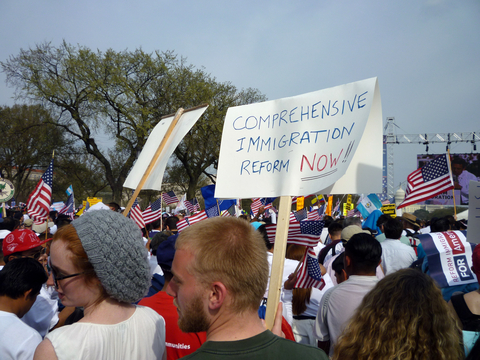 With immigration reform legislation stalled and on the back burner in Congress, local communities have taken action by enacting their own laws and ordinances to chase away Hispanic immigrants. Earlier this week, the Center for American Progress released a case study investigating five communities that enacted anti-immigration laws and the impact of these laws on the community.
With immigration reform legislation stalled and on the back burner in Congress, local communities have taken action by enacting their own laws and ordinances to chase away Hispanic immigrants. Earlier this week, the Center for American Progress released a case study investigating five communities that enacted anti-immigration laws and the impact of these laws on the community.
Such Laws Only Move the Problem, Not Solve Them
So, a town or suburb enacts an anti-immigration law that successfully chases them away, leaving no illegal immigrants within a 100-mile radius of the town. Where did they go? They didn’t disappear of the face of the Earth. They've gone to another town or suburb. The problem may have been “solved” right in your little oyster, but these immigrants have only gone elsewhere, starting the cycle all over again. If we as a country want to improve the situation for legal and illegal immigrants, we need comprehensive, national legislation to keep things consistent for these people, instead of local legislation popping up and constantly changing the rules.
Recent news on comprehensive immigration reform
Local Immigration Laws are Costly to Enforce
In 2007, Prince William County in Virginia passed a law that denied county services to anyone unable to prove legal residency. It also required police to check the immigration status of those detained or stopped for a traffic violation if the officer had “probable cause” to believe the person was in the country illegally. The police department estimated that it would cost an additional $3.2 million for cameras to document law enforcement activity in police guards. It would cost another $1.3 million to start the illegal immigration enforcement initiative, plus another $700,000 in annual costs. The department also warned against rising tension in the community that may cause other problems. It was eventually changed to allow status checks to those under arrest.
How much do these laws and ordinances really cost?
These Laws Hurt Local Economies
Riverside, New Jersey, a small town of approximately 8,000, lost $82,000 and valuable tax revenue as businesses closed within a year of their law being enacted in 2006. As 75 percent of immigrants fled the town, 45 percent of businesses had to close as a result. Their law imposed fines for landlords and employers who provided shelter or hired illegal immigrants, It also penalized companies doing any business anywhere in the United States that “aids and abets” an undocumented immigrant.
More Information about the impact of the law on Riverside
They End Up Wasting Taxpayer Dollars
Farmers Branch, Texas, a suburb of Dallas, has already spent $4 million in legal fees and expects to spend another $5 million to defend the law in court. Farmers Branch’s law requires apartment owners and manager to obtain official proof of citizenship and legal status from every family member renting on their property. It’s a $500-per-day fine for noncompliance. This law is now pending before the 5th Circuit Court of Appeals, after the lower courts’ rejected it based on violated of the federal supremacy clause in the U.S Constitution.
Most recent update regarding the Farmers Branch case
The Point of These Laws are to Make a Point. That’s It.
In September 2010, the Summerville, South Carolina Town Council decided to postpone its immigration measure and not waste taxpayer dollars.
“I just cannot with good conscience risk potentially spending millions in taxpayers’ dollars just to make a point,” said Town Councilman Mike Dawson at the meeting when the ordinance was tabled.
Derek Townsend of the Tomball, Texas council came to a similar conclusion about its own anti-immigration ordinances, saying that he didn’t “want us to get into lawsuits.”
Overall, the reasons for these laws are based on false assumptions and unsubstantiated fears. It was falsely assumed that the boom in the Hispanic population was a result of undocumented workers. Grievances were based on concerns that could be fixed in other ways, like the overcrowding of schools, hospitals, and housing. These laws play to people’s fears and fuel negative, unfounded stereotypes, such as the idea that immigrants are tax cheaters and criminals (because, of course, U.S. citizens aren’t either of those things). Instead of simply making a point, we ought to make a point to resolve our concerns with civility and rationality.
